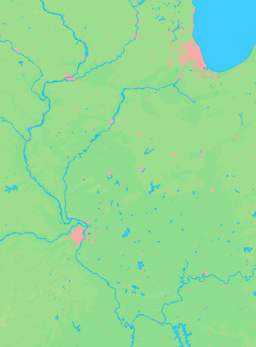El Paso, Illinois
| El Paso | |
| City | |
| Country | United States |
|---|---|
| State | Illinois |
| Counties | Woodford, McLean |
| Townships | El Paso |
| Elevation | 747 ft (228 m) |
| Coordinates | 40°44′20″N 89°0′58″W / 40.73889°N 89.01611°WCoordinates: 40°44′20″N 89°0′58″W / 40.73889°N 89.01611°W |
| Area | 2.13 sq mi (6 km2) |
| - land | 2.13 sq mi (6 km2) |
| - water | 0.00 sq mi (0 km2) |
| Population | 2,810 (2010) |
| Density | 1,743.9/sq mi (673/km2) |
| Timezone | CST (UTC-6) |
| - summer (DST) | CDT (UTC-5) |
| Postal code | 61738 |
| Area code | 309 |
| FIPS code | 17-23737 |
| GNIS ID | 2394632 |
  Location of El Paso within Illinois | |
| Wikimedia Commons: El Paso, Illinois | |
| Website: www | |
El Paso is a city in Woodford and McLean counties in the U.S. state of Illinois. The population was 2,810 at the 2010 census.[1] The Woodford County portion of El Paso is part of the Peoria, Illinois Metropolitan Statistical Area.
El Paso is a small community in central Illinois that took on more characteristics of a highway community after the construction of Interstate 39, which supplanted the older alignment of U.S. Highway 51. In addition, El Paso is a potential stop for Chicago-Peoria traffic via U.S. Highway 24.
History
El Paso was founded by George Gibson and James Wathen. Gibson named the city "El Paso" after El Paso, Texas,[2] or from the passing or crossing of two railroads.[3]
In August 1975, the city became the last locality in the contiguous United States to convert its telephone service from manual switching; prior to that time, telephones in the city could not be dialed directly from any outside location, the assistance of an operator being necessary to place the call, and local telephone numbers consisted of four digits. (Certain parts of the outer Aleutian Islands of Alaska could not be dialed directly until the early 1980s.)
Geography
El Paso is located at 40°44′20″N 89°0′58″W / 40.73889°N 89.01611°W (40.738800, -89.016034).[4]
According to the 2010 census, El Paso has a total area of 2.13 square miles (5.52 km2), all land.[5]
Demographics
| Historical population | |||
|---|---|---|---|
| Census | Pop. | %± | |
| 1860 | 890 | — | |
| 1870 | 1,564 | 75.7% | |
| 1880 | 1,390 | −11.1% | |
| 1890 | 1,353 | −2.7% | |
| 1900 | 1,441 | 6.5% | |
| 1910 | 1,470 | 2.0% | |
| 1920 | 1,638 | 11.4% | |
| 1930 | 1,578 | −3.7% | |
| 1940 | 1,621 | 2.7% | |
| 1950 | 1,818 | 12.2% | |
| 1960 | 1,964 | 8.0% | |
| 1970 | 2,291 | 16.6% | |
| 1980 | 2,676 | 16.8% | |
| 1990 | 2,499 | −6.6% | |
| 2000 | 2,695 | 7.8% | |
| 2010 | 2,810 | 4.3% | |
| Est. 2015 | 2,798 | [6] | −0.4% |
As of the 2000 United States Census,[8] there were 2,695 people, 980 households, and 686 families residing in the city. The population density was 1,743.9 people per square mile (671.3/km²). There were 1,022 housing units at an average density of 661.3 per square mile (254.6/km²). The racial makeup of the city was 98.89% White, 0.15% African American, 0.15% Native American, 0.22% Asian, 0.22% from other races, and 0.37% from two or more races. Hispanic or Latino of any race were 0.71% of the population.
There were 980 households out of which 35.9% had children under the age of 18 living with them, 57.9% were married couples living together, 8.6% had a female householder with no husband present, and 29.9% were non-families. 25.2% of all households were made up of individuals and 13.1% had someone living alone who was 65 years of age or older. The average household size was 2.58 and the average family size was 3.12.
In the city the population was spread out with 26.6% under the age of 18, 8.6% from 18 to 24, 28.7% from 25 to 44, 19.8% from 45 to 64, and 16.3% who were 65 years of age or older. The median age was 36 years. For every 100 females there were 92.1 males. For every 100 females age 18 and over, there were 87.7 males.
The median income for a household in the city was $47,745, and the median income for a family was $55,286. Males had a median income of $36,406 versus $25,174 for females. The per capita income for the city was $21,730. About 1.6% of families and 3.2% of the population were below the poverty line, including 2.1% of those under age 18 and 6.6% of those age 65 or over.
Culture
Attractions
- El Paso Public Library - A Carnegie library built in 1907[9]
- Archbishop Fulton John Sheen Spiritual Centre[10]
- El Paso Golf Club[11]
Notable people
- John S. Kyser, President of Northwestern State University from 1954 to 1967, was born in El Paso[12]
- Fulton J. Sheen, Catholic archbishop and televangelist, was born in El Paso[13]
Education
El Paso's school district, CUSD #11,[14] is the product of a consolidation with the school district of Gridley, IL. CUSD #11's schools are split between El Paso and Gridley. The schools located in El Paso are:[15]
- El Paso Gridley High School - Housing all of the high school classes for the district
- Centennial School - Housing all the 5th through 6th grade classes of the district
- Jefferson Park[16] - Housing the El Paso portion of district's elementary schools students
References
- ↑ "Profile of General Population and Housing Characteristics: 2010 Demographic Profile Data (DP-1): El Paso city, Illinois". U.S. Census Bureau, American Factfinder. Retrieved July 17, 2012.
- ↑ Callary, Edward. 2009. Place Names of Illinois. Champaign: University of Illinois Press, p. 111.
- ↑ Gannett, Henry (1905). The Origin of Certain Place Names in the United States. Govt. Print. Off. p. 118.
- ↑ "US Gazetteer files: 2010, 2000, and 1990". United States Census Bureau. 2011-02-12. Retrieved 2011-04-23.
- ↑ "G001 - Geographic Identifiers - 2010 Census Summary File 1". United States Census Bureau. Retrieved 2015-12-27.
- ↑ "Annual Estimates of the Resident Population for Incorporated Places: April 1, 2010 to July 1, 2015". Retrieved July 2, 2016.
- ↑ "Census of Population and Housing". Census.gov. Retrieved June 4, 2015.
- ↑ "American FactFinder". United States Census Bureau. Retrieved 2008-01-31.
- ↑ "El Paso Public Library - National Register of Historic Places Registration Form" (PDF). June 29, 1994. Retrieved October 4, 2016.
- ↑ Vlahos, Nick. "Two museums tell the tale of Archbishop Fulton J. Sheen". Retrieved 2016-10-04.
- ↑ "El Paso Golf Club - Home Page". www.elpasogolfclub.com. Retrieved 2016-10-04.
- ↑ "John S. Kyser," A Dictionary of Louisiana Biography. Louisiana Historical Association, www.lahistory.org/
- ↑ Patricia A. Kossmann, "Remembering Fulton Sheen," America: The National Catholic Review, Dec. 6, 2004.
- ↑ "El Paso - Gridley CUSD #11". www.unit11.org. Retrieved 2016-10-04.
- ↑ User, Super. "Contact Information". www.unit11.org. Retrieved 2016-10-04.
- ↑ "JP and GGS". www.unit11.org. Retrieved 2016-10-04.